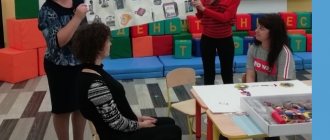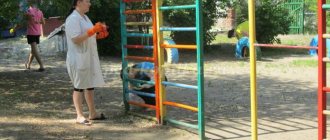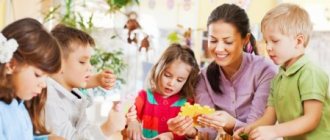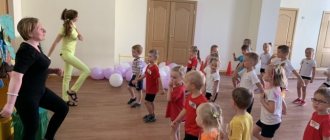Article:
For every child, the preschool period is a very important time in life. At this time, the foundations of his future are laid, character is formed, health is strengthened, various vital skills and abilities are formed and consolidated, characteristics and talents are revealed, and personal training and education begins. That is why this period receives the most attention in modern pedagogical science and in its practical application in preschool institutions. For the full formation of a child’s personality and his all-round development, the interaction of kindergarten teachers with parents or guardians of pupils is of enormous importance.
Features of education and training of preschool children
Nature and evolution have decreed that a person gives birth to offspring that are physically and psychologically unprepared for independent existence. Unlike most animals, whose young are born fully formed and able to move, children of our species require the full attention of adults. Immediately after birth and until they reach several years of age, children cannot do without support and services. All this is provided to them by the family or structures that replace it.
A child’s personality is shaped by adults who are role models through upbringing and education. These are, first of all, immediate relatives - mothers, fathers, grandfathers and grandmothers, and then kindergarten teachers. They are the ones who are next to the kids in the first, most important years of their lives. Therefore, both the family and the kindergarten have a huge influence on the upbringing and education of preschool children. In order to get a full-fledged person with strong mental and physical health, excellently prepared for future life, the activities of parents and kindergarten teachers must be coordinated and integral. This is what the interaction between the two most important “branches of education” - family and social - serves.
From the experience of working as an interaction teacher
The pedagogical basis for changes in preschool education in accordance with FGT at the present stage is the active involvement of parents in the work of preschool educational institutions. Kindergarten and family are two educational phenomena, each of which gives the child social experience in its own way.
The influence of family upbringing on a child is so strong that it can nullify any pedagogical efforts of a preschool educational institution. Teachers understand that without agreement with the family, pedagogical influences lose all power. Only in combination with each other do they create optimal conditions for a little person to enter the big world. This implies the relevance of one of the mechanisms for implementing FGT - increasing the responsibility of parents for raising children, in-depth interaction between the family and the preschool educational institution.
Family education is unique in its impact and this uniqueness is determined by the following reasons:
- the primacy of the family environment due to the biological and psychological dependence of the child on the parents;
- maximum age-related sensitivity during preschool childhood to communication with a significant adult, which arises before the need to communicate with a peer;
- the duration and consistency of stay in the family, the intimate-emotional atmosphere of family relationships: love, affection, individualization of communication between family members and the child.
The younger generation will be like their family. Recognition of the priority of family education requires a different relationship between the family and the preschool institution. First of all, their novelty is determined by the concept of “interaction,” which is a way of organizing joint activities that are carried out through communication. I strive to ensure that both children and parents feel comfortable in the preschool educational institution, as well as to ensure that parents are confident in the support of their educational actions. In accordance with this, the position of the preschool institution in working with the family is changing, namely, improving the forms and methods of cooperation between the preschool educational institution and the family in the comprehensive development of the child.
The goal of my work is to solve problems related to the revival of the traditions of family education, the involvement of parents in the pedagogical process of preschool educational institutions.
The main objectives of interaction between preschool educational institutions and parents are the following:
1. Increasing the activity and responsibility of families of kindergarten students and involving them in cooperation in matters of child development.
2. Providing information and educational support for parents’ choice of directions in development and education through the development of a competent pedagogical position in relation to their own child.
3. Promoting the creation of conditions for the development of the child’s abilities in various types of educational activities, ensuring continuity of preparation for the next educational stage (school education).
4. Increasing the level of parental competence.
In addition to traditional forms of work for preschool educational institutions and families, I actively use innovative forms and methods:
- presentation of educational activities of preschool educational institutions;
- frontal and individual surveys of parents, studying the problems of families of pupils;
- information booklets;
- organization of Open Days;
- joint leisure activities;
- group meetings - workshops, master classes, round tables, discussions, video presentations;
- “Portfolio Day” - designing a folder of your child’s successes and achievements every month;
- themed leisure activities “My Family”, “New Year’s Kaleidoscope”, “Defenders of the Fatherland”, “Trip to the Museum”, KVN “Nature Experts”;
- joint entertainment within the framework of gender-role socialization “I am a boy, I am a girl”;
- involvement in competitions (autumn crafts, bird feeders, snow buildings, New Year's toys, “Little Beauty”, “Heroes of Russia”);
- health holidays “Dad, Mom, I – a friendly family”, “Barefoot for colds”;
- joint entertainment within the framework of the Public Educational Program “Security”.
- theatrical performances for children with the participation of parents “Umka and the New Year”, “The Adventures of Pochemuchka”.
Based on these positions, I welcome any form of inclusion of parents in the life of the kindergarten. For this:
- I inform parents about everything that is happening or will happen in the group and in kindergarten in a special calendar in the group lobby.
- I invite you to discuss the current situation in the development of the child and make a decision on further joint actions of teachers, specialists and parents who can ensure the successful development of students.
- I offer creative homework for parents with children, allowing them to build a trusting relationship with their child and at the same time participate in the educational process.
- I encourage parents to participate in methodological activities: making costumes, playing materials, video filming.
One of the main forms of work on pedagogical education of the family is the parent meeting. I would like to say that I have moved away from the outdated lecture method of conducting meetings. I use techniques that activate the attention of tired parents, make it easier to remember the essence of conversations, and create a special mood for a friendly conversation. After a short introduction, I move on to the discussion, using moments from the life of the group as examples, including staging fragments from the practice of raising children, including practical tasks, games, relay races, and musical accompaniment. In some cases, I offer parents joint activities with their children, and then I move on to discussing the problem without the children. At the end of the year I hold a meeting in the form of KVN.
Collective creative work helped unite the team of children and parents, evaluate each other differently, get to know and, perhaps, discover new facets of each other’s personality, and this applies to both adults and children.
Focusing on the problems of organizing individual and group consultations, I consider it necessary to tell parents that it is important not only to work with their child competently, but also to achieve results. It is the family that is the main source of sympathy and support for a preschooler and can provide it in a timely, subtle and unobtrusive manner. However, parents, often unaware of this aspect of interpersonal relationships, do not always understand that the child often turns to them not for specific advice, but specifically for understanding. During the consultation process, I try to explain to parents that a child usually reacts sharply to a negative assessment of his successes and is sensitive to its belittling, therefore it is home relationships that are often the main means of compensating for insufficient success or underestimation of others outside the family.
Educational work periodically concerns issues of organizing types of children's activities. In my work, I draw the attention of parents to the importance of play activities. The child develops as an individual and personality in and through play, receiving a variety of information about the world and himself from adults and peers, primarily in objective and verbal activities, in communicative communication. The game as a cultural phenomenon teaches, develops, educates, socializes, provides relaxation, and it also parodies, ironizes, laughs, and publicly demonstrates the relativity of social statuses and positions. Childhood without play is impossible. Depriving a child of play practice is depriving him not just of childhood, but also of the main source of development: creativity, mastered life experience, signs of social practice, the richness and microclimate of collective relationships, knowledge of the world. Therefore, I explain the meaning of the game to parents, who are very often concerned, first of all, with the child’s intellectual preparation for school.
Parents have the opportunity to offer their ideas on lexical topics, bring materials or books, share their knowledge with their children, teach them what they themselves know and love. To do this, parents do not need to have teaching abilities at all - children are happy when mom or dad are just in the group.
Visiting kindergarten during “Open Doors Week” - 2 times a year. At this time, parents have a unique opportunity to “live” the whole day in kindergarten with their child - watch and take part in morning warm-ups, attend classes, go for a walk, eat meals, do awakening exercises after a nap, play with children etc.
Help in replenishing kindergarten funds (toys, books, magazines and materials that are no longer needed at home, but may well be useful when organizing the educational process in a preschool educational institution). Assistance in the production of didactic materials for classes and free play activities of children (selection of tasks, photocopying of cards).
I welcome the desire of parents to have full information about the issues being resolved in the process of holding the Pedagogical Council, and we also provide parents with the opportunity to take part in discussions on issues of interest to them in the upbringing and development of preschool children.
For creative communication, there is such a form of work with the family as thematic exhibitions (themes of the exhibitions are “Beautiful dishes”, “Decorative and applied arts”, “My favorite toys”, “Good deeds of our family”, “Gifts for my beloved mother”, etc.) . These exhibitions provide opportunities for parents and children to organize joint activities. Parents note that in the process of jointly preparing materials for the exhibition, adults and children get to know each other even better; the family has another opportunity to talk about the child, about his life in the group and at home.
I attach great importance to the type of cooperation - holidays. Not only teachers and children prepare them, but parents also actively participate in them. And, despite being busy, parents respond, and over time they themselves strive to participate in the holidays, since it is at such moments that they themselves become liberated, on the one hand, and on the other hand, they better understand the state of their children when they perform in front of them.
In the course of the work, the following results were obtained:
- the level of parental competence has increased;
- parent-child relationships were harmonized;
- Parents’ responsibility for the child’s fate and their activity in relations with preschool employees has increased.
How did this affect the development of the child’s personality:
- the emotional climate in the family has improved;
- the parental assessment of the child’s talents has changed towards greater objectivity, the level of parental aspirations has become better correlated with the child’s abilities;
- The emotional intensity and information content of contacts between parents and children has increased.
In conclusion, it should be noted that the advantages of innovative forms of interaction between preschool educational institutions and families of pupils are undeniable and numerous:
– a positive emotional attitude of teachers and parents to work together to raise children. Parents are confident that the preschool educational institution will always help them in solving pedagogical problems and at the same time will not harm them, since the family’s opinion and suggestions for interaction with the child will be taken into account. Teachers, in turn, enlist the understanding of parents in most problems (from material to economic and many others). And the biggest winners are the children, for whose sake this interaction is carried out;
– taking into account the child’s individuality. The teacher, constantly maintaining contact with the family, knows the characteristics and habits of his pupil and takes them into account when working. Which, in turn, leads to increased efficiency of the pedagogical process;
– the opportunity for parents to independently choose and form, already in preschool age, the direction in the development and upbringing of the child that they consider necessary. In this way, parents begin to understand the responsibility they have for raising their children;
– strengthening intra-family ties, which, unfortunately, is also a problematic issue in pedagogy and psychology throughout time;
– the possibility of implementing a unified program for the upbringing and development of children in preschool educational institutions and families.
I am convinced that the better the communication between the family and the kindergarten group, the more support the child will receive, the more likely it is that his life in kindergarten will be full of impressions, love and trust in the environment, and the first social experience will be successful. I am sure that my students will easily adapt to school.
Thus, in the emotionally rich atmosphere of family relationships, which has no analogues in society, lies the most important reserve for enriching the sensory and social-moral experience of a preschooler.





